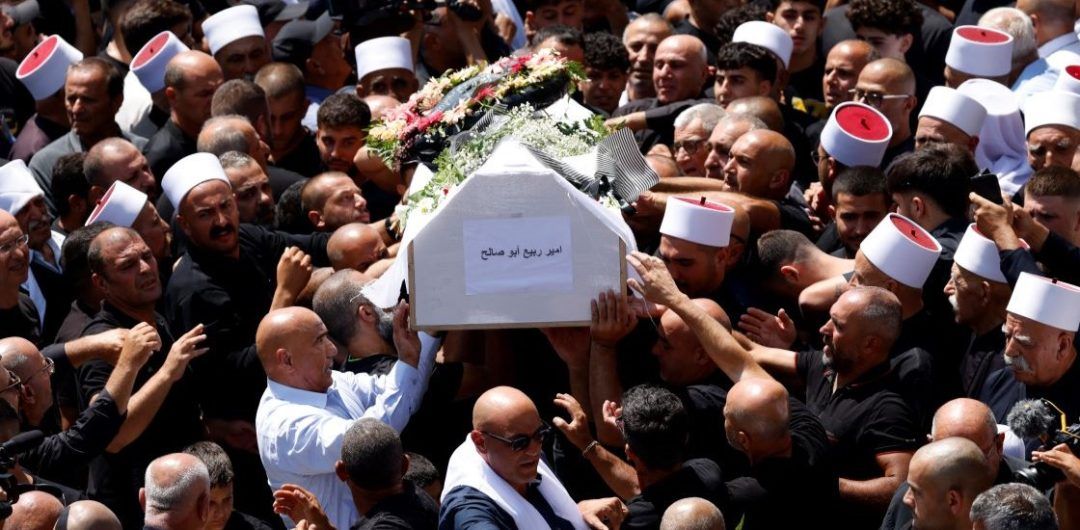- Home
- Middle East
- Anxious Israeli Druze Bid Farewell to Majdal Shams Victims

©(Jalaa Marey / AFP)
Thousands of Druze gathered in Majdal Shams on Sunday to mourn the deaths of young people killed by a rocket the previous day amid the ongoing conflict between Hezbollah and Israel.
With tears in their eyes, thousands of Druze climbed the steep streets of Majdal Shams on Sunday to attend the funeral of young people killed the day before in this small town by a rocket that fell on the Golan Heights, annexed in large part by Israel.
“This is the first time a tragedy of this magnitude has happened here,” lamented Fadi Mahmoud, a 48-year-old building contractor from this Druze land at the gateway to Syria and Lebanon. “These children belong to everyone here, we all know each other, our community is very close-knit,” he says.
A human tide flooded the alleyways as people from Israel's Druze community (an Arabic-speaking minority of around 150,000) came from all over, especially from Galilee. Some had driven for over an hour to find their own people, all dressed in black.
Hundreds of notables and clerics, wearing traditional garb including a white veil covering the mouth for the women, and a tarboosh girded with a white cloth for the men, also accompanied a procession from which prayers and songs of mourning rose.
“Leave our children out of these wars,” whispered a sobbing woman from the middle of the procession.
[readmore url = "https://thisisbeirut.com.lb/israel-hamaswar/276032"]
In the wake of coffins covered in white sheets and gypsophila, parents fell to the ground. In front of them, young people carried portraits of the deceased, who were aged between 10 and 16 and had been on a soccer pitch below the town before the tragedy of the previous day.
A few elected representatives from the Knesset (the Israeli parliament) came to offer their condolences and answer questions from a swarm of journalists.
Many in the crowd expressed their fears about the war that broke out on October 7 between Israel and Hamas in the Gaza Strip, and its consequences beyond Palestinian territory, particularly for their town close to the border with Lebanon.
Since then, Hezbollah has been exchanging fire with Israel on an almost daily basis, with the Lebanese Islamist movement claiming to be supporting its Hamas ally and the Palestinians in Gaza. Israel launched the war there after the bloody Hamas attack on Israeli soil on October 7.
“Majdal Shams' mourning was caused by the ongoing war (in Gaza, Editor's note), and it should bring everyone together, show that we really need the war to stop,” analyzes Ziyad, a 63-year-old man who did not wish to give his surname.
On the sidelines, a few people are warming up, reflecting the divisions within this community, which comes from a branch of Shiite Islam and is spread over three countries.
“I'm so scared,” says Amani Safadi, a 22-year-old student who points out that the residents of Majdal Shams have also been hearing “all the explosions” for almost ten months.
According to the Israeli authorities, 22 soldiers and 24 civilians have been killed by Hezbollah fire since October 7.
In the stadium at the foot of the limestone ridges above which the rockets cross the sky, below clusters of pretty houses with balconies overflowing with bougainvillea and bindweed planters, 12 chairs covered in black have been set up on the lawn in front of a ball, also encircled in black. When passers-by spot them, many burst into tears.
Chloe Rouveyrolles-Bazire, with AFP
With tears in their eyes, thousands of Druze climbed the steep streets of Majdal Shams on Sunday to attend the funeral of young people killed the day before in this small town by a rocket that fell on the Golan Heights, annexed in large part by Israel.
“This is the first time a tragedy of this magnitude has happened here,” lamented Fadi Mahmoud, a 48-year-old building contractor from this Druze land at the gateway to Syria and Lebanon. “These children belong to everyone here, we all know each other, our community is very close-knit,” he says.
A human tide flooded the alleyways as people from Israel's Druze community (an Arabic-speaking minority of around 150,000) came from all over, especially from Galilee. Some had driven for over an hour to find their own people, all dressed in black.
Hundreds of notables and clerics, wearing traditional garb including a white veil covering the mouth for the women, and a tarboosh girded with a white cloth for the men, also accompanied a procession from which prayers and songs of mourning rose.
“Leave our children out of these wars,” whispered a sobbing woman from the middle of the procession.
[readmore url = "https://thisisbeirut.com.lb/israel-hamaswar/276032"]
From 10 to 16 Years Old
In the wake of coffins covered in white sheets and gypsophila, parents fell to the ground. In front of them, young people carried portraits of the deceased, who were aged between 10 and 16 and had been on a soccer pitch below the town before the tragedy of the previous day.
A few elected representatives from the Knesset (the Israeli parliament) came to offer their condolences and answer questions from a swarm of journalists.
Many in the crowd expressed their fears about the war that broke out on October 7 between Israel and Hamas in the Gaza Strip, and its consequences beyond Palestinian territory, particularly for their town close to the border with Lebanon.
Since then, Hezbollah has been exchanging fire with Israel on an almost daily basis, with the Lebanese Islamist movement claiming to be supporting its Hamas ally and the Palestinians in Gaza. Israel launched the war there after the bloody Hamas attack on Israeli soil on October 7.
'It's Beyond Us'
“Majdal Shams' mourning was caused by the ongoing war (in Gaza, Editor's note), and it should bring everyone together, show that we really need the war to stop,” analyzes Ziyad, a 63-year-old man who did not wish to give his surname.
On the sidelines, a few people are warming up, reflecting the divisions within this community, which comes from a branch of Shiite Islam and is spread over three countries.
“I'm so scared,” says Amani Safadi, a 22-year-old student who points out that the residents of Majdal Shams have also been hearing “all the explosions” for almost ten months.
According to the Israeli authorities, 22 soldiers and 24 civilians have been killed by Hezbollah fire since October 7.
In the stadium at the foot of the limestone ridges above which the rockets cross the sky, below clusters of pretty houses with balconies overflowing with bougainvillea and bindweed planters, 12 chairs covered in black have been set up on the lawn in front of a ball, also encircled in black. When passers-by spot them, many burst into tears.
Chloe Rouveyrolles-Bazire, with AFP
Read more



Comments